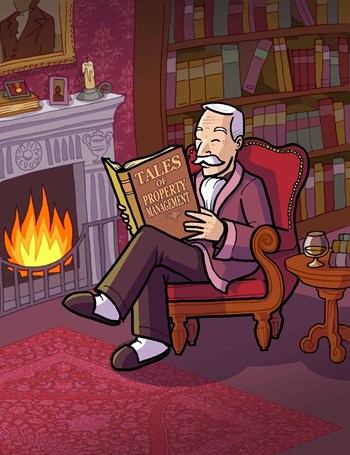
Managing a portfolio of co-ops and condos can be an adventure, no matter how small the buildings or how civil and well-mannered the shareholders and owners. Problems inevitably arise, and when they do, the managing agent can often wind up feeling a little like Dirty Harry. They solve the problems nobody else wants—or is qualified—to handle, and they must often do so in innovative ways. And while most days their adventures involve disputes about noise and heating temperatures and cooking smells rather than chasing serial killers across co-op rooftops…it is New York, so you never know. As one manager remarked when told of this piece’s focus, “There’s just so much crap that goes on.”
To expand a little upon that comment, we asked some veteran property managers in Gotham to share their most memorable adventures. The stories, ahem, made our day.
Shouts & Murmurs
While Steven Birbach, chairman of Carlton Management in Glenwood Landing, has taken a number of unusual calls, he remembers the most unusual noise-related complaint. In one apartment were newlyweds, who worked odd hours. In the unit directly below was a single woman whose powers of hearing were positively Kryptonian.
The wife would come home from a late shift at two in the morning. She’d wake up her husband, and the two of them would enthusiastically engage in an activity young newlywed couples are known to enjoy.
No sooner did the festivities commence then the woman downstairs “would go ballistic,” Birbach says. “She’d take a broom and bang on the ceiling. More than once she actually went upstairs, knocked on the door, and told them to 'get a room.'” She also saw fit to send Birbach a two-page e-mail describing the issue in excruciating detail.
Noise complaints tend to be a combination of one neighbor who is insensitive and another who is hypersensitive. This one was more of just the former. It’s not like the couple were getting noise complaints for playing loud music or practicing the trumpet until the wee hours—in fact, for all the ire the situation raised in the downstairs neighbor, it wasn't really clear whether it was the volume she objected to, or the nature of the racket itself she found more offensive.
In the end, there’s not much a property manager can do about this sort of problem, other than encourage communication to help the two parties arrive at a solution. “It’s something between neighbors, not something the board should get involved in,” Birbach says.
Ultimately the problem stopped. Either the honeymoon was over, or the couple's hours shifted—or maybe the downstairs neighbor found a boyfriend and fought back, as it were.
Judge Judy & Executioner
Extensive plumbing work in one co-op required cutting into the living room wall of a shareholder we'll call Dave. When the plumbing job was finished, a building-financed contractor came and plastered up the wall. The place looked good as new.
A few months later, Albert Mayas, a property manager and executive managing director with Charles H. Greenthal Management Corporation in Manhattan, took an unusual call. Seems that Dave was so eager to reclaim his living room that he pushed his sofa back against the repaired wall while the plaster was still wet. The sofa adhered to said wall, and when Dave moved the sofa, the whole new plaster job came tumbling down. He claimed negligence on the part of the contractor and wanted the wall re-plastered and the sofa replaced.
Mayas asked the contractor—a respected vendor whom the company had used for years—about the charge. The contractor denied any wrongdoing. He hadn’t moved the furniture back in the room, and he wouldn’t have done so when the plaster was still wet.
Mayas called Dave and explained that, while he was sorry this had happened, there was nothing he could do. It came down to the contractor’s word versus Dave’s. Dave grumbled a bit, but that was that. Or so Mayas thought.
A few months later, he took another unusual call. The producers of the TV show Judge Judy—a sort of latter-day People’s Court, presided over by the irascible Judge Judith Sheindlin—were on the line. They thought Dave’s case would be just perfect for their program. Would Mayas be interested in appearing on the show and allowing Judge Judy to resolve the matter before a national television audience?
Even though both sides get an appearance fee—an appearance fee that would have paid for new plaster and a new sofa, with plenty left over—Mayas had four words for the producers: “No way, no how!” From an administrative standpoint, the matter had already been resolved.
In the end, not even Judge Judy could save Dave. He eventually fixed his living room wall and sold his apartment. No word on what became of the sofa.
By Hooker, By Crook
How can you tell you have a brothel operating in one of the apartments in your co-op? Well for starters, the windows are blacked out. There is a parade of men coming in and out of the apartment at all hours of the day and night, and they tend not to make eye contact when you pass them in the hallway. And they don’t make much noise (unless we’re back to the newlyweds again).
Experts say that prostitutes are more difficult to catch than, say, drug dealers because of the burden of proof—there's usually no concrete physical evidence of wrongdoing. Escort services are legal but you still probably wouldn’t want one doing business in your building. So how does one make the unwanted activity cease without launching a disruptive, embarrassing investigation or incurring legal costs?
Gregory Cohen, president of Impact Management in Flushing, found a brilliant way of solving the problem when he realized there was a brothel operating in one of the co-ops he manages.
“We put a security guard outside the door at $9 an hour,” he says. “They were gone in two days.”
The board president at one of Birbach’s properties had a similar problem. He tried to be a vigilante, and it almost cost him dearly.
This board president—let’s call him Steve—kept fielding calls about the alleged goings-on in the building but was skeptical. It is often the case that alleged brothels turn out not to be brothels at all. So Steve decided to find out for sure.
Dressed in slightly different attire than his usual board president get-up, Steve went to the apartment, knocked on the door, waved a hundred dollar bill in front of the person who answered, and said he was interested in what was inside. He was admitted. Just as he suspected, here was a brothel operating right in his very building!
At that point, Steve was sort of like an undercover cop. But unlike an undercover policeman, he did not have the backing of the actual NYPD. Which proved problematic for Steve when the place was raided by real undercover officers just a few minutes after he arrived.
Steve found himself handcuffed, arrested, and brought to the precinct station. So there Steve was, in the holding tank at the city jail, surrounded by the prostitutes, madams, and johns he was attempting to infiltrate. Birbach was called—presumably Steve used his one call to phone the property manager—and was able to convince the police that Steve was indeed the board president and was just in the apartment in that capacity to investigate the problem. Steve was released, the brothel was shut down, and Birbach had a great story for his memoirs.
Well, Do Ya?
This is, of course, only a small sampling of what goes on every day in the life of a New York property manager—many of whom did not want to be interviewed for this piece, but all of whom have stories to tell. In fact, if you think you can pull the wool over the eyes of a good property manager, there’s only one question to ask yourself: Do you feel lucky? n
Greg Olear is a freelance writer, novelist and a frequent contributor toThe Cooperator.






Leave a Comment